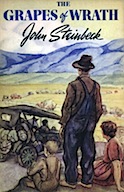 I usually make myself write these blog posts within hours of finishing the book so I don’t forget what I want to say about them. Except I finished reading The Grapes of Wrath a couple of days ago, so I don’t have as much to talk about.
I usually make myself write these blog posts within hours of finishing the book so I don’t forget what I want to say about them. Except I finished reading The Grapes of Wrath a couple of days ago, so I don’t have as much to talk about.
I really loved this novel. It’s the most beautiful English I’ve read in a long, long time. Here’s the first paragraph:
To the red country and part of the gray country of Oklahoma, the last rains came gently, and they did not cut the scarred earth. The plows crossed and recrossed the rivulet marks. The last rains lifted the corn quickly and scattered weed colonies and grass along the sides of the roads so that the gray country and the dark red country began to disappear under green cover. In the last part of May the sky grew pale and the clouds that had hung in high puffs for so long in the spring were dissipated. The sun flared down on the growing corn day after day until a line of brown spread along the edge of each green bayonet. The clouds appeared, and went away, and in a while they did not try any more. The weeds grew darker green to protect themselves, and they did not spread any more. The surface of the earth crusted, a thin hard crust, and as the sky became pale, so the earth became pale, pink in the red country and white in the gray country.
After I read that paragraph, I knew I’d be able to get through this novel. Whole (short) chapters like these are interspersed with the actual plot.
As with Crime and Punishment, this book is so widely read that it has its own Cliff’s Notes, so I’m not going to bother with a real summary. It’s basically about a family from Oklahoma who gets forced out of their house during the Depression and the Dust Bowl, moves to California (with all the other farmers), and tries to survive. It’s sad but soooo rewarding. I had a hard time not crying.
I’ve read two other Steinbeck novels: Travels with Charley and Of Mice and Men. The former was required reading before my senior year of high school, which was a looong time ago, and all I really remember about it is that I liked it. I read Of Mice and Men a couple of years ago, and I liked that one, too. The language, though isn’t what stuck out for me about those novels – okay, I don’t remember enough about Travels with Charlie to make that statement fairly. Both are very short novels, and I think Steinbeck might work best with a longer form.
The other day, my mom asked me what I was reading, and when I told her, she said that she liked it and that it was sad. I said, “Wait. You’ve read The Grapes of Wrath?” I really wasn’t expecting that. I guess she read it in high school or college. Which brings me back to my earlier point on professors not assigning long books anymore. This novel is the kind you assign to make people love literature and language. Sure, Of Mice and Men is great, but I’ve found it hard to get absorbed in a short book, and I think most authors do best when they have some space to dig in their roots.
Until very recently, I haven’t been a fan of long books. I’ve always had an attention span issue, and I’d lose interest after a couple of days or a couple hundred pages. And I think the shorter books I’ve always been assigned is what made the difference. The syllabus, for instance, would you have five days to read The Awakening (it’s very short), and then we’ll discuss it for one (maybe two!) class periods. That’s not what college should be. Isn’t the point to learn to analyze and write about literature? How are you supposed to do that when you never really get into anything beyond surface level? It’s impossible if you’re only discussing it for an hour. Reading longer books for my 52-Books-in-a-Year challenge has totally changed my mind about this stuff. Professors are pressured to fit a ton of stuff into their syllabi, and it’s the students who are suffering. It’s become quantity over quality (Must Prepare for the Lit GRE!), so it’s no wonder universities are churning out English majors who are barely even literate.
BONUS (I couldn’t help myself):
